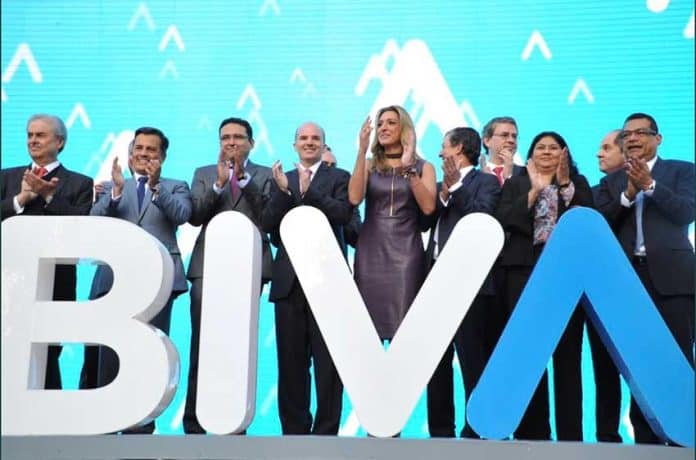A new stock exchange launched in Mexico today after five years of preparations, breaking a 43-year monopoly on the public market.
The Bolsa Institucional de Valores, or BIVA exchange, joins the existing Bolsa Mexicana de Valores (BMV), or Mexican Stock Exchange (BMV), giving Mexico two exchanges for the first time since 1975.
The BIVA will trade the same instruments as the BMV including equities, debts and warrants, with the competition between the two expected to help drive economic growth.
The new exchange will offer a new source of financing to companies and more options for investors, the newspaper El Financiero reported today.
In its opening auction, the BIVA said that more than 100 buy and sell orders were issued and that the first entered into its system came from the brokerage firm Finamex.
The exchange uses technology provided by New York-based Nasdaq and, according to its corporate brochure, “BIVA is one of the most advanced exchanges in the world.”
BIVA CEO María Ariza told Nasdaq associate vice-president Mark Driscoll that BIVA’s “ambition is to be seen by Mexican and global investors as a technological and innovative stock exchange.”
In the interview — which is published on the Nasdaq website — Ariza said “we’ve triggered regulatory changes that have modernized the stock market in Mexico” and “we want to give the Mexican market and its companies more visibility around the world so that global investors can invest in new opportunities our country has to offer.”
She also said that BIVA wants to “completely reshape the way a company enters the public market and the whole experience of being a public company.”
The Harvard-educated CEO described technology as a “key player” for BIVA, explaining that modern exchanges use it for trading, surveillance, data analysis and distribution.
Ariza said that some of BIVA’s trading characteristics are protocols in line with international standards, broker dealer anonymity, block trading book, closing auction and full market depth of the books.
“In a continuously-changing world, where new technologies and asset classes come into play every day, we need to be at the forefront to give a better service to our clients and continue to attract new players into the markets. Nasdaq helps us to make this possible and continue growing,” she said.
Today’s commencement of trading is the culmination of a process that started more than five years ago.
In February 2013, the Mexican company Cencor submitted the project to create a new stock exchange to federal financial authorities and subsequently worked closely with the Secretariat of Finance, Mexico’s central bank and the Mexican Banking and Securities Commission towards its development.
In October 2015, the company formally applied for a concession to organize and operate the new exchange and the authorities granted approval in August last year.
This morning’s opening ceremony was attended by Finance Secretary José Antonio González Anaya, Cencor CEO Santiago Urquiza and Ariza, among other officials.
Mexico is the 15th largest economy in the world but ranks eight places lower in terms of market capitalization, according to the World Federation of Exchanges.
All 14 countries with larger economies than Mexico have at least two stock exchanges.
There are currently 146 listed companies in Mexico with a combined market capitalization of US $466.1 billion but with the entry of the BIVA, the number of public companies is expected to grow to 200 in the next three to five years.
Source: El Financiero (sp), Nasdaq (en), El Economista (sp)
